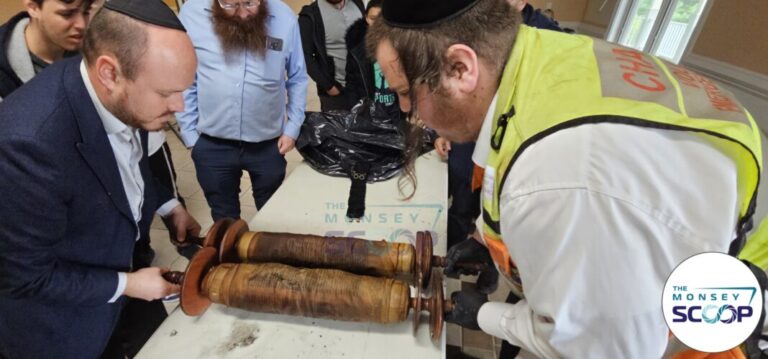The Ten Days of Penitence are drawing to a close. Elul, the month of repentance and preparation for the Days of Judgment, is behind us. Rosh Hashanah has passed, and we approach Yom Kippur with awe and trepidation, for on this day our fate in the coming year will be sealed, our destinies decided.
As we all know, Hashem’s judgment upon us is not arbitrary. It depends on our deeds. And so we have been given these days leading up to the great and awesome judgment to rectify the past, repent for our misdeeds, atone for our sins and commit ourselves to a future of good deeds in the service of Hashem.
When we pause and reflect on our actions, weighing them to ascertain whether they are worthy, most of us immediately think in terms of our religious obligations in the service of Hashem. Were we concentrating on what we were saying when we prayed or were we merely mumbling the words whilst watching the clock? Were our prayers said with genuine feeling? Perhaps there were times when we missed praying altogether. Did we observe Shabbos in all its aspects? Did we set aside enough time for learning Torah? Perhaps we unwittingly transgressed prohibitions without even realizing because we never got round to setting aside time to study Halacha? This list goes on, and each person must indeed make a cheshbon hanefesh (a self-accounting), examining his deeds, actions and even thoughts to ascertain what is wrong, inappropriate, missing or in need of improvement.
However, if we take a close look at the Yom Kippur liturgy, we will notice a surprising emphasis on a completely different area of a person’s activities – his interaction with his fellow man. For a start, take a look at the list of aveiros (sins) that we recite in the Vidui (the confessional said several times during the course of Yom Kippur) and you will note how many of them relate to the obligations that a person has to his fellow man. And prominent amongst these are those that relate to our monetary matters.
Let us move on to the haftorah (additional reading from the Prophets) for Yom Kippur. The prophet Isaiah rebukes the people who think that they can effect repentance and appease G-d by fasting and physical affliction that are devoid of inner conviction:
Can such be the fast I choose, a day when man merely afflicts himself? Can it be bowing his head like a bulrush and making a mattress of sackcloth and ashes? Do you call this a fast and day of favor to Hashem? Surely this is the fast I choose: open the bonds of wickedness, dissolve the groups that pervert [justice], let the oppressed go free and annul all perverted [justice]…. Then you will call and Hashem will respond, you will cry out and He will say, “Here I am!” If you remove from your midst perversion, finger-pointing and evil speech. (Isaiah, 58).
The haftorah of the minchah (afternoon) service of Yom Kippur also provides inspiration in this regard. The people of Nineveh heeded Yonah’s call and repented, with the king leading the way. “Let them call out mightily to G-d; each person is to turn back from his evil way and from the robbery which is in their hands…. And G-d saw their deeds… and G-d relented concerning the calamity He had said He would bring upon them.” (Yonah, 3:8-10) As the Talmud in Ta’anis 16a notes, the verse does not say that G-d saw their sackcloth and fasting, but that he saw their deeds – they had returned any illegally attained property that was in their possession and thus repented fully.
The climax of Yom Kippur is the Neilah prayer. Indeed, Neilah is the culmination of the entire period of repentance starting all the way back on the first of Elul. And what do we pray for at this most holy and decisive of moments? “You gave us, Hashem our G-d, with love this Day of Atonement, a deadline, pardon and forgiveness for all our iniquities so that we can withdraw our hands from financial oppression (lema’an nechdal me’oshek yadeinu).” Of all our sins, the crime of financial wrongdoing is the one that we are most desperate to avoid.
There are several reasons why repentance from this sin is so central to the service of Yom Kippur. Firstly, Chazal tell us that, “[If one has] a box full of sins, which is the one that accuses before all? Theft!” (Yalkut Shimoni, Vayikra, 660). So when we arrive at the Day of Judgment, we don’t want to fall at the first fence. But there’s more to it than that: “For people sin with idol worship, immorality and murder, yet gezel is more severe than all of them” (ibid). The wicked generation that perished in the Flood at the time of Noach transgressed some of the most severe offenses, yet the one that sealed their fate was gezel (Sanhedrin, 108). And Chazal tell us that “One who steals even a penny from his fellow man is considered to have taken his life” (Bava Kama, 119b).
Now, most of us do not transgress the sin of theft in the classic sense. We don’t rob banks or steal other people’s property. Nevertheless, the Torah demands a lot more under the rubric of gezel. Don’t flat-out steal, but also don’t cheat, lie, or trick. Don’t force a person to sell his property, don’t hold back wages, don’t encroach on another’s livelihood, and don’t overcharge or underpay. Keep your word, honor your commitments, and deal fairly and with integrity to all.
Some people have the mistaken attitude which allows them to make an illegal profit through another man’s loss. “Of course I’m not a thief,” they say, “I’m simply an astute businessman. After all, business is business!” They are wrong. Business is Torah. Business is Halachah. And if it isn’t, it’s gezel, plain and simple. Perhaps most tragic of all, such a person will not reap any benefit from the acts of charity done with his ill-gotten gain. Chazal tell us that if a person used his non-kosher money to perform a mitzvah, he does not have any benefit from his good deed, no matter how well-intentioned he may have been. And it’s worse than that. The mitzvah is not just worthless; it has actually caused a negative effect. Don’t bring a king a gift made of material that he has banned. And don’t bring the King of Kings a mitzvah paid for with non-kosher money.
But what about the majority of us who do not have this immoral attitude? Most of us understand that Halacha should reign supreme even in our business dealings. For people like us, the Mesillas Yeshorim (Chapter 11) teaches an important lesson, “Just as the desire for money is great, so too the opportunities for stumbling in this area are numerous. To be genuinely uncontaminated from gezel, one needs to employ much assessment and scrutiny. But one who succeeds in cleansing himself from any trace of gezel has achieved a very high spiritual level.” The Mesillas Yeshorim is telling us that good intentions by themselves are not enough. Real vigilance regarding the specifics of the Halacha is needed or else one can easily transgress direct Torah prohibitions of gezel. So let us all scrutinize our financial activities. Let us correct any past misdeeds and ensure that from now on our actions will be measured carefully to ensure that they comply with all the Halachos of kosher money. When we raise our ‘clean hands’ in prayer, we will surely be answered, and we will be inscribed and sealed in the book of life and blessing, us and all of Israel.
This article has been written by The Bais HaVaad L’Inyonei Mishpat and is meant for awareness purposes only. A slight variation of the facts can significantly change the Halacha. For Choshen Mishpat related questions or services please contact The Bais HaVaad office located on 32 Fifth St. in Lakewood N.J. or call 1.888.485.VAAD(8223)or email [email protected] For articles and for other forms of Choshen Mishpat content please visit www.BaisHaVaad.com





